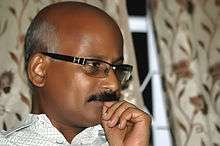Samar Deb
| Samar Deb | |
|---|---|
 | |
| Born |
1 November 1963 Coochbehar, West Bengal, India |
| Occupation | Chief Sub-Editor |
| Language | Bengali |
| Nationality | Indian |
| Ethnicity | Indian |
| Citizenship | India |
| Alma mater | A.B.N. Seal College |
| Notable works | "Lohit Parer Upakatha", "Aalo Andhokar" and "Amma Tera Munda" |
| Spouse | Kabita Ghosh |
Samar Deb (Bengali: সমর দেব) (born 1 November 1963) is an Indian Bengali writer & poet deeply committed to a revolutionary and radical chain of thoughts. He was born at Coochbehar, West Bengal. He is the youngest child of Satish Chandra Deb and Sabita Deb.
He is most known for his classic novel, Lohitparer Upakatha (2010).
Personal life
He studied in Jenkins School, Coochbehar, and completed matriculation in 1978. Then he studied at Mariani College, Mariani, Assam under Dibrugarh University and from A.B.N. Seal College, Coochbehar, under North Bengal University. Between 1981 and 1992, he edited various magazines and journals. He moved to Guwahati in the year 1993 and joined the Bengali Daily Newspaper "Ganapatrika" as Chief Sub-Editor and then changed to the Bengali Newspaper "Samay Prabaha" in 1994 and worked there till the year 2000. Since April 2000 he has been working as the Chief Sub-Editor of the Bengali Newspaper "Dainik Jugasankha".
At present he is the chief sub-editor of the Bengali Newspaper, 'Dainik Jugasankha'. His wife, Kabita is a former journalist and a freelance writer. He lives at Jyotikuchi, Guwahati.
Works
Samar Deb is renowned as a fiction writer, and justifiably so. But he writes poems as well and "Aalo Andhokar" (Light & Darkness) and "Amma Tera Munda" (Mom, your Son) are arguably his most acclaimed collection of poems.
Samar Deb over the years consistently contributed to various little magazines, journals, etc. which together constitute a promising alternative mode of literary culture in Assam and Bengal that challenges the influence of big capital. It is equally noteworthy that his writing style deconstructs the gentle middle class and sub-altern ethos of the society. Most of his characters belong to the lower strata of existence. His fictions reinvigorate the received Bengali language with forceful idioms and expressions from the margins, which might often bombard the chaste taste of a Tagorean upper and middle class, still very much under the spell of a 19th-century Victorian sensibility.
List of Major Works
- Yayati - A Collection of Poems (Published - 1986)
- Ek Yug Atmapratarana - Novel (Published - 2003)
- Amma Tera Munda - A Collection of Poems (Published - 2004)
- Ekti Golper Suluk Sandhan (Novel) (Published - 2006)
- Aalo Andhakar - A Collection of Poems (Published - 2006)
- Lohitparer Upakatha[1] - Novel(Published - 2010)
- Neel Andhakar - Novel (Published - 2012)
References
- ↑ Kar, Sushanta. "Lohitparer Upakatha". Lohitparer Upakatha. Vicky Publishers. Retrieved 15 February 2011.